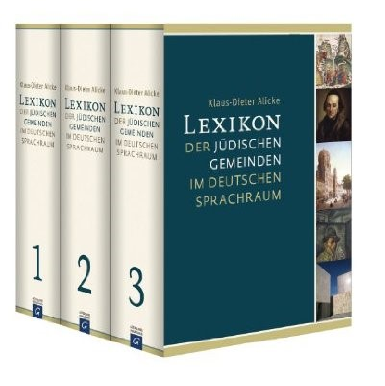
Eichkatzrund 12
29308 Winsen (Aller)
Germany

November 2018 marked the eightieth anniversary of the days synagogues in Germany were set on fire, Jewish cemeteries were vandalized, vast numbers of Jewish citizens were beaten and Jewish-owned businesses plundered, and tens of thousands of Jewish men sent to concentration camps for days, weeks, or months — many of whom did not survive the Nazi terror. These violations, organized by the National Socialist government, ushered in the transition from the discrimination and marginalization of German Jews that had been ongoing since 1933 to the systematic persecution that cluminated a few years later in the Holocaust of the European Jews.
For me, the seventieth anniversary of the November pogroms – better known in English by the Nazi euphemism “Kristallnacht” – seemed the right time to publish a reference work on the history of Jewish communities in German-speaking countries and thus to take a stand against amnesia. For many centuries, Jews have been leaving traces in German history. German Jews have made their mark on the Central European cultural landscape through exceptional scholarship and artistic works. At times they were instrumental in turning German cities into centers of European culture.
Much of this history has today been forgotten. Cities and villages that were once homes to thriving Jewish communities today bear at most only traces of their Jewish past – traces that remain even after the organized National Socialist policies of persecution and extermination. Yet the Nazis were not able to obliterate all of Jewish culture. With the publication of this reference work, I wanted to uncover the remaining traces, bringing to light that which had been forgotten and so opening a path to new knowledge and insights.
Over the course of my ten years of research, I received generous support for the project from municipal and rural administrations, Jewish congregations, museums and memorials, and local organizations and non-profits, as did many local historians. Only thanks to the access they provided to their often-extensive material was I able to complete the Lexikon der jüdischen Gemeinden im deutschen Sprachraum (Encyclopedia of Jewish Communities in German-Speaking Regions). Particularly useful were the extensive online archives of the Alemannia Judaica research group, many of whose documents and images I was able to incorporate.
In 2018, my research reached an end of sorts. That was when “brief profiles” of (almost) all Jewish communities had been completed; presumably there will be only a few small changes to make in the future.
All places referenced on the Jewish Communities Archive website have been included in Jewish Place’s interactive map as geolocalized information.
Klaus-Dieter Alicke
Online Archive of Jewish Communities
Point of contact:
Klaus-Dieter Alicke
Eichkatzrund 12
29308 Winsen (Aller), Germany
Alicke.Winsen@googlemail.com
http://www.jüdische-gemeinden.de